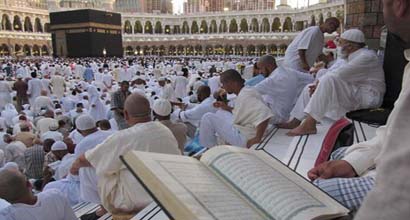
Prayer is prescribed five times a day to refresh one’s belief and consciousness of Allah, Glory be to Him.
`Ibadah (worship) is an Arabic word derived from `abd (a slave) and means submission. It portrays that Allah is the Master while people are His slaves. A slave is to obey his master and seek his master’s pleasure, which is one of the meanings of worship.
The Islamic concept of worship is very wide. If you free your speech from filth, falsehood, malice and abuse, speak the truth, talk goodly things and do all these only because Allah has so ordained you to do so, this is a kind of `ibadah.
If you obey the law of Allah, in letter and spirit, in your commercial and economic affairs and abide by it in your treatment of your parents, relatives, friends and all those who come in contact with you, then all these activities of yours are worship. If you help the poor and the destitute, give food to the hungry, serve the ailing and the afflicted persons and do all of this not for any personal gain but only to seek the pleasure of Allah, they are also a kind of worship. Even your economic activities, the activities you undertake to earn your living and to feed your dependents, are worship if you remain honest and truthful in them and observe the law of Allah. In short, all your activities and your entire life are worship if they are in accordance with the law of Allah, and your heart is filled with fear of Him and your ultimate objective in undertaking all these activities is to seek His Pleasure.
Thus, whenever you do well or avoid evil for fear of Allah, in whatever sphere of life, you are demonstrating your Islamic obligations. This is the true significance of worship, namely total submission to the pleasure of Allah by the molding into the patterns of Islam your entire life, leaving out not even the most insignificant part thereof. To help achieve this aim, a set of formal `ibadat (acts of worship) has been constituted, which serves as a course of training. These acts are thus the pillars on which the edifice of Islam rests.
Prayer (salah) is the most primary and the most important of these obligations. So, what is prayer? It is prescribed five times a day to refresh one’s belief and consciousness of Allah, glory be to Him. One gets up early in the morning, cleanses oneself and stands before Allah for prayer.
The various poses that one assumes during prayers are the very embodiment of the spirit of submission; the various recitals remind one of one’s commitments to Allah. The Muslim seeks His guidance and asks Him again and again to enable him avoid His wrath and follow His chosen path.
When the Muslim reads from the Book of Allah, it refreshes his belief in the Day of Judgment and enlivens in his memory the fact that he will have to stand before Allah and be called for account about his entire life. This is how the Muslim’s day starts.
Then, after a few hours the next call for prayer is declared. So, he will again submit to Allah and renew his covenant with Him. In prayer, one dissociates oneself from the worldly engagements for a few moments and seeks guidance from Allah. This once again brings to the power of his mind his real role in life. After this rededication, one reverts to one’s occupations, with hope of reverting again to prayer a few hours later. This acts as a reminder to the Muslim and refreshes his faith.
When the sun sets and the darkness of the night begins to cover the earth, one again submits to Allah in prayer so that he should not forget his duties and obligations in the midst of the approaching shadows of the night. And then after a few hours, one again stands before Allah, and this is the last prayer of the day.
Before going to bed, the Muslim once again renews his faith and prostrate before Allah. And this is how the Muslim’s day come to an end. The frequency and timings of the prayers never let the object and mission of life be lost in the maze of worldly activities.
It is easy to understand how the daily prayers strengthen the foundations of your faith, prepare the Muslim for the observance of a life of virtue and obedience to Allah, and refresh that belief from which springs courage, sincerity, purposefulness, purity of heart, advancement of the soul and enrichment of morals.
Now see how this is achieved: You perform ablution in the way prescribed by the Prophet (peace be upon him). You also perform your Prayers according to the instructions of the Prophet. Why do you do so? Simply because you believe in the Prophethood of Muhammad (peace be upon him) and deem it your bounden duty to follow him ungrudgingly.
What makes you say your prayers at places where there is no one to ask you to offer them or even to see you offering them? Isn’t it because of your belief that Allah is ever looking at you? What makes you leave your important business and other occupations and rush towards the mosque for Prayers? What makes you terminate your sweet sleep in the early hours of the morning, go to the mosque in the heat of the noon and leave your evening entertainments for the sake of prayers?
Is it anything other than sense of duty -your realization that you must fulfill your responsibility to Allah? And why are you afraid of any mistake in prayer? Because your heart is filled with the fear of Allah and you know that you have to stand before Him on the Day of Judgment and give an account of your entire life.
Now look! Can there be a better course of moral and spiritual training than prayer? It is this training which makes man a perfect Muslim. It reminds him of his covenant with Allah, refreshes his faith in Him, and keeps the belief in the Day of Judgment alive and ever present before his mind’s eye. It makes him follow the Prophet and trains him in the observance of his duties.
Indeed, this is a strict training for conforming one’s practice to one’s ideals. Obviously, if a man’s consciousness of his duties towards his Creator is so acute that he prizes it above all worldly gains and keeps refreshing it through prayers, he would certainly not be inviting the displeasure of Allah that he all along has striven to avoid. He will abide by the law of Allah in the entire gamut of life in the same way as he follows it in the five prayers every day.
This man can be relied upon in other fields of activity as well, for if the shadows of sin or deceit approach him, he will try to avoid them for fear of Allah that would be ever present in his heart. And if -even after such a vital training- a man misbehaves himself in other fields of life and disobeys the law of Allah, it can only be because of some intrinsic depravity of his self.
Then, again you must fulfill your prayers in congregation, especially the Friday Prayer. This creates among the Muslims a bond of love and mutual understanding, arouses in them a sense of collective unity and fosters among them national fraternity. All of them say their prayers in one congregation, which inculcates in them a deep feeling of brotherhood.
Prayer is also a symbol of equality, for the poor and the rich, the low and the high, the rulers and the ruled, the educated and the unlettered, the black and the white; all stand in one row and prostrate before their Lord.
Moreover, prayer inculcates in Muslims a strong sense of discipline and obedience to the elected leader. In short, prayers train them in all those virtues that make possible the development of a rich individual and collective life.
These are a few of the myriad of benefits we can derive from the daily Prayers.
_________________
Source: onislam.net.
[opic_orginalurl]


